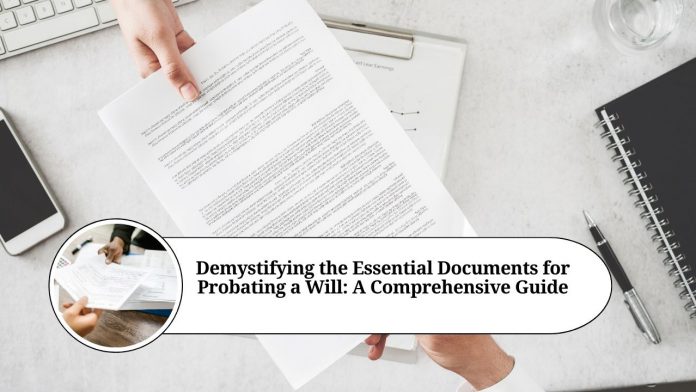Essential Documents Required for the Probate of a Will
The probate process involves legally establishing the validity of a will and overseeing the distribution of assets to the beneficiaries. While the specific requirements for probating a will may vary depending on the jurisdiction, certain key documents are generally required to initiate and complete the probate proceedings. In this blog, we will explore the essential documents necessary for the probate of a will.
Original Will:
The original will is the most critical document for probate. It serves as the legal instrument outlining the wishes of the deceased regarding the distribution of their assets. The court needs the original will to verify its authenticity and ensure it meets the legal requirements. A photocopy or digital version of the will is generally insufficient for probate, as it could be easily tampered with or forged.
Death Certificate:
A certified copy of the death certificate is an essential document in the probate process. It serves as proof of the testator’s death and is required to initiate probate proceedings. The death certificate is typically issued by the local vital records office or the relevant authority responsible for registering deaths.
Petition for Probate:
To commence the probate process, the executor or personal representative must file a petition with the probate court. The petition provides necessary information, such as the testator’s name, date of death, and a request to admit the will to probate. The court will review the petition and grant the executor the authority to administer the estate.
Letters Testamentary or Letters of Administration:
After the court approves the petition for probate, the executor or personal representative will receive Letters Testamentary (if named in the will) or Letters of Administration (if there is no named executor or the executor cannot perform their duties). These letters serve as legal proof of the representative’s authority to act on behalf of the estate.
Inventory of Assets:
An inventory of the deceased’s assets is a crucial document for probate. It includes a detailed list of all assets owned by the deceased at the time of their death, such as real estate, bank accounts, investments, personal belongings, and any outstanding debts. The inventory helps in determining the value of the estate and facilitates the distribution process.
Creditor Claims:
During probate, creditors have the right to make claims against the deceased’s estate for any outstanding debts. The personal representative must publish a notice to creditors, providing them with an opportunity to come forward with their claims. It is important to keep a record of all creditor claims and payments made to ensure the proper administration of the estate.
Final Accounting:
At the conclusion of the probate process, the personal representative is required to prepare a final accounting. This document details the financial transactions related to the estate, including income, expenses, and distributions to beneficiaries. The final accounting provides transparency and accountability, ensuring that the estate has been administered correctly.
Proof of Heirship:
In some cases, the court may require proof of heirship to determine the rightful beneficiaries of the estate. This document establishes the legal relationship between the deceased and the heirs, confirming their entitlement to inherit the assets. Proof of heirship can be established through birth certificates, marriage certificates, adoption papers, or other relevant legal documents.
Waivers and Consents:
When multiple beneficiaries are involved, it may be necessary to obtain waivers and consents from them. These documents acknowledge their agreement to the terms outlined in the will and their consent to the appointment of the chosen executor. Waivers and consents help prevent potential disputes or challenges to the probate process, ensuring a smoother administration.
Trust Agreements:
If the deceased had established a living trust, it is essential to include the trust agreement as part of the probate documentation. Trust agreements outline the distribution of assets held in the trust and designate a successor trustee to handle the trust administration. Incorporating the trust agreement in the probate process ensures the orderly transfer of assets according to the testator’s intentions.
Tax Returns and Documents:
Various tax-related documents may be required during the probate process. This includes the deceased’s final income tax return, which must be filed for the year of their death. Additionally, estate tax returns may be necessary if the estate’s value exceeds the applicable threshold. Supporting documents such as W-2 forms, financial statements, and records of charitable contributions should be gathered as well.
Court Forms and Filings:
In addition to the specific documents mentioned above, there may be various court forms and filings necessary for probate. These can include forms for the initial petition, notices to interested parties, proof of service, and any other forms mandated by the jurisdiction’s probate laws. It is crucial to consult with an attorney or review the local court’s guidelines to ensure compliance with the required forms and filings.
Conclusion:
Probating a will involves a series of legal procedures, and having the necessary documents is crucial for a smooth and efficient process. The original will, death certificate, petition for probate, letters testamentary or letters of administration, inventory of assets, creditor claims, and final accounting are among the essential documents required for the probate of a will. By gathering and organizing these documents, the executor or personal representative can navigate the probate process successfully and ensure the deceased’s final wishes are carried out accurately.
Read More Useful Content:
Frequently asked questions (FAQs) related to the documents required for the probate of a will:
Q1: Can a photocopy or digital version of the will be used for probate?
A1: Generally, no. The court typically requires the original will to verify its authenticity and ensure it meets the legal requirements. Photocopies or digital versions may be considered insufficient as they can be easily tampered with or forged.
Q2: What if the original will cannot be located?
A2: If the original will cannot be found, the court may accept a copy or a draft of the will. However, additional evidence, such as witness testimonies or affidavits, may be required to establish the validity of the will.
Q3: Is a death certificate required for probate?
A3: Yes, a certified copy of the death certificate is an essential document for initiating probate proceedings. It serves as proof of the testator’s death and is typically issued by the local vital records office or relevant authority responsible for registering deaths.
Q4: What is the purpose of the petition for probate?
A4: The petition for probate is a document filed with the probate court by the executor or personal representative. It provides necessary information, such as the testator’s name, date of death, and a request to admit the will to probate. The court reviews the petition and grants the executor the authority to administer the estate.
Q5: What are Letters Testamentary or Letters of Administration?
A5: Letters Testamentary (if named in the will) or Letters of Administration (if there is no named executor or the executor cannot perform their duties) are legal documents issued by the court. They grant the executor or personal representative the authority to act on behalf of the estate and carry out their duties.
Q6: Do I need to prepare an inventory of assets?
A6: Yes, an inventory of assets is typically required for probate. This document lists all the assets owned by the deceased at the time of their death, including real estate, bank accounts, investments, personal belongings, and outstanding debts. The inventory helps determine the value of the estate and facilitates the distribution process.
Q7: How do creditor claims impact the probate process?
A7: Creditors have the right to make claims against the deceased’s estate for any outstanding debts. The personal representative must publish a notice to creditors, providing them with an opportunity to come forward with their claims. Keeping a record of creditor claims and payments made ensures the proper administration of the estate.
Q8: What is a final accounting, and why is it necessary?
A8: A final accounting is a document prepared by the personal representative at the conclusion of the probate process. It details the financial transactions related to the estate, including income, expenses, and distributions to beneficiaries. The final accounting provides transparency and accountability, ensuring the estate has been administered correctly.




















